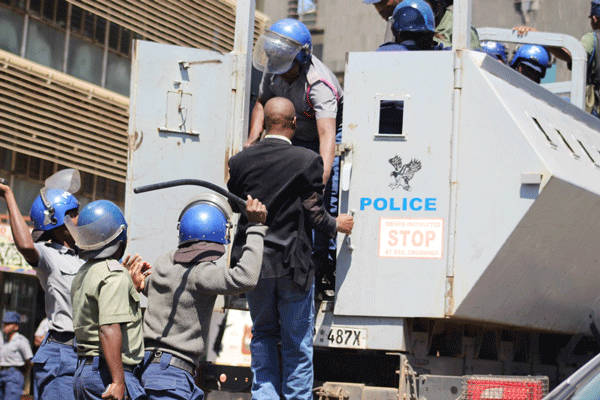
BY Brenna Matendere
Civic groups and opposition parties have warned that alleged abductions, torture, harassment and intimidation of defenceless citizens by suspected state security agents is putting the country’s peace at stake.
They said this last week as Zimbabwe joined the rest of the world in commemorating International Day of Peace held every year on September 21.
This year’s commemorations marked the 72nd anniversary of the signing of the Universal Declaration of Human Rights (UDHR), which Zimbabwe has sought to domesticate through a comprehensive Bill or Declaration of Rights under Chapter 4 of the constitution.
Zimbabwe Peace Project (ZPP) director Jestina Mukoko told The Standard that people are yearning for a normalised situation in the country where those in power uphold the constitution and respect human rights.
She said a survey conducted by the organisation revealed that people wanted a government which works to ensure everyone enjoys a thriving economy and equal opportunities in all spheres.
“More importantly, Zimbabweans emphasised that citizens are not each other’s enemies,” Mukoko said.
“Peace is not just the absence of war, but the existence of an enabling environment, where human and people’s rights are realisable. Sadly, this year, while the Zimbabwean government was supposed to foster unity, rallying all in the fight against the common enemy — Covid-19 — it used this period to unleash terror on citizens who dared speak out.”
- Chamisa under fire over US$120K donation
- Mavhunga puts DeMbare into Chibuku quarterfinals
- Pension funds bet on Cabora Bassa oilfields
- Councils defy govt fire tender directive
Keep Reading
Several activists among them Harare West MP Joana Mamombe and Tawanda Muchehiwa, a nephew of ZimLive editor Mduduzi Mathuthu, were recently abducted and tortured by suspected state security agents, but the government is denying responsibility.
Mukoko herself is a victim of state-sponsored abduction and torture during the reign of the late former president Robert Mugabe.
In a statement, ZPP emphasised that President Emmerson Mnangagwa’s government must respect the constitution and ensure that all Zimbabweans enjoy their rights.
“In addition to understanding that human rights actors and political activists are not enemies, but have an important and justifiable constitutional role in advocating for accountability,” said the organisation.
MDC Alliance deputy spokesperson Clifford Hlatywayo said that at present, Zimbabwe does not qualify to be branded a peaceful nation despite the absence of military war.
“The peace of Zimbabweans locally and abroad is at stake. Our peace is under threat from the state. The illegitimate regime has become our stumbling block in attaining peace in Zimbabwe. As citizens we need to pursue our own peace because it is the backbone of individual and national development,” he told The Standard.
“We join all nations to commemorate this year’s International Peace Day. Both political and socio-economic peace is under threat. Education and health care systems have been destroyed. Political space has been shuttered. The human rights and fundamental freedoms is now a taboo in Zimbabwe. The generation ahead of us is plundering and destroying our resources and robbing Zimbabwe’s future.”
Another victim of severe torture and Amalgamated Rural Teachers Union of Zimbabwe president Obert Masaraure said inequality was the worst enemy of peaceful coexistence.
“The world should bridge the inequality gap to build sustainable and genuine peace. Our education systems should be used to uplift livelihoods not just to train labourers,” Masaraure said.
“In the Zimbabwean context, the underpayment of teachers and other workers at a time when the ruling elites are enjoying executive luxuries is a serious threat to peace. The state repression we are witnessing is driving citizens to the edge.”
The Zimbabwe Elections Support Network (Zesn) called for the strengthening of the National Peace and Reconciliation Commission and the Zimbabwe Human Rights Commission to foster a culture of peace and tolerance.
“In addition, Zesn calls upon the government to put in place conflict resolution mechanisms and early warning systems to ensure that peace, tolerance and respect of human rights are upheld in Zimbabwe,” said the elections watchdog.
“The Network recommends that there is need for government to come up with an action plan on the United Nations Security Council Resolution 1325 on women and peace and which was unanimously adopted by the UN Security Council on October 31, 2000 to address the disproportionate and unique impact of armed conflict on women and girls.”
Zimbabwe Council of Churches secretary-general Reverend Kenneth Mtata told The Standard that Zimbabwe needed “positive peace”.
“We insist that the quality and sustainability for our national development is largely dependent on the quality of our peace. Negative peace only means there is no outright war. Positive peace speaks to the qualitative coexistence of all actors in an environment of cooperation in spite of the differences,” he said.
“Political leaders can show lack of peace by their lack of compassion and propensity to use violence to resolve disagreements. Some of our public leaders were abused during the war and never got healed. They got oriented to violent means of resolving differences. They, thus, inflict pain on anyone disagreeable to them.
“As a nation we will need to retrain our police, army and other state security organs to appreciate the non-violent approach to dealing with citizens. Some will need psychotherapeutic help to heal them from the pain they harbour.”










